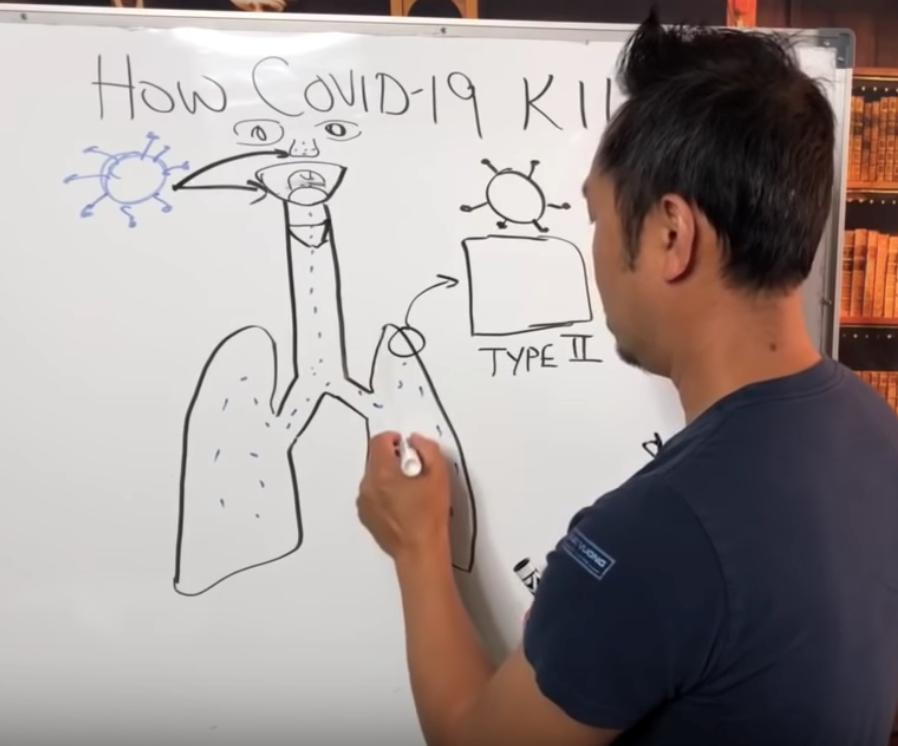How Coronavirus Kills and How Social Distancing Saves Lives

How Coronavirus Kills and How Social Distancing Saves Lives
Background
We’re already a few months into the Coronavirus outbreak, and the US Government has just added another month to the recommended social distancing measures, now extending them to April 30th. As the impact of the virus worsens, many might be wondering how it actually works. In this YouTube video, Dr. Duc Vuong uses a whiteboard to demonstrate exactly what happens to those that are infected.
First, Dr. Vuong covers some definitions. Coronavirus is a family or types of viruses that have been with us for a long time. The specific name of this current “novel” (meaning new) coronavirus is SARS-COV-2. The name of the disease it causes is COVID-19.
Because this is a novel, or new, coronavirus, there is no built up immunity to it. This means that everyone who comes in contact with it will be infected and show symptoms. So far, 80% of people that have been infected have a “mild” case. This simply means that they do not need to be hospitalized. However, they could still experience extremely unpleasant symptoms and could be miserable for weeks. The other 20% need to be hospitalized, and about half have needed respirators.
If you do the math for the number of people that will need respirators throughout this crisis, it is clear that we do not have enough for the number of people that will need one. This means there will be people we just cannot save, not because they are beyond help, but because our healthcare system is overwhelmed.
How Coronavirus Works
Coronavirus spreads through contact with infected droplets produced when an infected person coughs or
sneezes. The droplets make their way into mucus membranes through contact with our nose or mouth, either through the air or through being picked up on surfaces, where they can live for a few days. The virus then goes down our trachea into the person’s airways and lungs.
Lungs have two types of cells – Type 1 Pneumocytes and Type 2 Pneumocytes. They also have an important feature called aveoli, which are little air pockets. Type 1 Pneumocytes are responsible for exchanging oxygen when you inhale to carbon dioxide when you exhale. Type 2 Pneumocytes produce a substance called surfactant, which help the aveoli collapse and expand. They also have a receptor called angiotensin converting enzyme – or ACE. This protein controls blood pressure. All together, these features are what make breathing possible.
Coronavirus specifically targets the angiotensin converting enzyme (which is why people with high blood pressure are at a higher risk of severe symptoms). It then makes its way into your Type 2 Pneumocyte, replicates itself, and kills these cells. This triggers an inflammatory immune response.
When the immune response gets out of control, it becomes fatal. Because of the death of the Type 2 Pneumocyte cells, the alveoli fills up with fluid, causing something we know as pneumonia.
As more fluid comes into the lungs, it’s harder to get rid of. Eventually, the lungs stiffen and can’t expand and contract like they’re supposed to, so they can’t get rid of the fluid. In addition, the cells that exchange oxygen are being destroyed. This leads to Acute Respiratory Distress Syndrome – or ARDS. At this stage, it is nearly impossible to breathe; you will feel like you’re suffocating. This is how COVID-19 kills.
Once the virus attacks your lungs, other organs that need oxygen will be affected. If your heart doesn’t get enough oxygen, you could go into cardiac arrest. If your kidneys don’t get enough, you experience kidney failure. This is another reason why those who have underlying issues such as asthma, heart conditions, obesity, and high blood pressure are more at risk of death. The virus may primarily attack your lungs, but your lungs are necessary to the function of many other organs.
Treatment
There is only a short amount of time between when someone gets to the point of ARDS to when treatment becomes necessary. Eventually, the ill person’s muscles become at risk of “tiring out” by trying to breathe while under attack. At this point, the person needs a ventilator to breathe for them, because their lungs can no longer do it. Currently, about 50% of people on a ventilator don’t make it.
The bigger problem is that we don’t even have enough ventilators for all the people who will get to the point of needing one, meaning even more people are going to die. Therefore, it is incredibly important to take every possible measure to avoid contracting the virus – social distancing, thoroughly washing your hands, and sanitizing your environment whenever possible.
The goal is to keep the number of infected people down so as many people can receive treatment as possible.
- Keeping Austin out of the Emergency room
- We remain open because chiropractic is considered an essential health care service. Our primary goal is keeping Chiropractic care as clear and open to you as possible.
- Chiropractic is a huge factor in doing that. It's been proven that chiropractic care reduces the need for medical care of all kinds. The #1 reason for adults to visit the ER is severe musculoskeletal pain and issues. By remaining open, can help limit the amount of people needing emergency services during a period of already-overwhelmed healthcare systems
- Finding Groceries and Delivery
- Some stores run out of food quickly or have very long lines. And many curbside pickups don’t have available time slots. This article shares some alternative local stores and online delivery options that you may not have yet discovered.
- Extra help for seniors
- Special Hours. Here is a list of participating grocery stores offering special hours for senior citizens. Not all stores have defined a minimum age for seniors.
- Home Delivery
- HEB has teamed up with FAVOR to deliver groceries to people, 60 and older The Favor Senior Support Line is 833-397-0080 from 9am to 1pm every day. Items are delivered on the same day ordered. Seniors can also place their orders on Favor’s website (https://favordelivery.com/seniors) or download the Favor app and search for H-E-B. All delivery and service fees are waived for the first 30 days of the program. Orders will include a $10 tip which goes entirely to the Favor Runner, who will personally shop and deliver items.
Please let us know if you need anything. While you may be physically alone, you can still be connected. Our Austin chiropractors are here to help you and your family!
Our Location
Austin Chiropractic & Rehab
5775 Airport Blvd #300
Austin, TX
8:00 am - 12:30 pm
2:00 pm - 6:00 pm
8:00 am - 12:30 pm
2:00 pm - 6:00 pm
8:00 am - 12:30 pm
2:00 pm - 6:00 pm
8:00 am - 12:30 pm
2:00 pm - 6:00 pm
8:00 am - 12:30 pm
Closed
Closed
